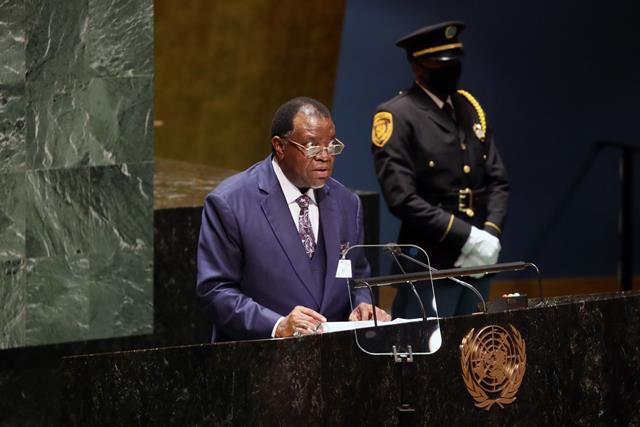 23 September, 2021: President Hage Geingob at the 76th session of the United Nations General Assembly. [pool photo by Spencer Platt/UPI Credit: UPI/Alamy]
23 September, 2021: President Hage Geingob at the 76th session of the United Nations General Assembly. [pool photo by Spencer Platt/UPI Credit: UPI/Alamy]
[This is an excerpt from an article in The Round Table: The Commonwealth Journal of International Affairs.]
On 4 February 2024, Namibia’s President Hage Geingob lost his short battle with cancer. His second five-year term in office would have ended on 21 March 2024. Following Sam Nujoma (1990–2005) and Hifikepunye Pohamba (2005–2015) as third Head of State, he was the first of the veterans to depart from this world. A member of the first ‘struggle generation’, he nevertheless was an ‘outlier’. He represented the liberation movement SWAPO (South West African People’s Organisation) from the mid-1960s at the United Nations while also studying Political Sciences, obtaining a BA at Fordham University and an MA at The New School. In 2004, he added a PhD at the University of Leeds to his academic credentials with a thesis on state formation in Namibia. From 1975 onwards, he was the only Director of the United Nations Institute for Namibia in Lusaka. In mid-1989, he returned from exile during the transition to independence under UN supervision, overseeing SWAPO’s election campaign. He chaired the elected Constituent Assembly and was largely responsible for the adoption of the normative framework in February 1990 as the last step to Independence (21 March 1990).
He was the first Prime Minister until 2002. Refusing to support President Sam Nujoma’s campaign for an extension of the latter’s presidency beyond the constitutional term limits, he fell into oblivion. Declining a demotion to the rank of an insignificant minister, he accepted the headship of the World Bank’s Global Coalition for Africa in Washington. This detour in his political career was most likely a decisive step in upholding Namibia’s constitutional principles, as Nujoma finally decided to retire in 2005. Geingob returned as a backbencher of SWAPO to the National Assembly in 2004. Nujoma’s successor, Hifikepunye Pohamba, welcomed him back to the party leadership, appointed him as Minister of Trade and Industry and as from 2012 again as Prime Minister. Nominated SWAPO’s candidate for the presidential elections in 2014, he secured a record result of 86% of votes.
Germany and reparations: the reconciliation agreement with Namibia – 2022
Colonial genocide and the German-Namibian ‘reconciliation agreement’ – 2021
Namibia’s parliamentary and presidential elections: the honeymoon is over – 2020
In his inaugural address, he introduced the metaphor of the Namibian House:
All of us must play our part in the success of this beautiful house we call Namibia. We need to renew it from time to time by undergoing renovations and extensions. … Let us stand together in building this new Namibian house in which no Namibian will feel left out.
This turned him into a president of unfulfilled promises. Statistically with an annual per capita income of close to US$ 10000 a higher-middle-income-country, Namibia is one of the most unequal societies, with half the population living in or near poverty. Many felt left out, and his declared crusade against corruption did not show any convincing results.
Geingob treasured the Constitution, calling it a ‘living document’. Civil liberties as the guiding principles of political culture and governance allow for freedom of speech and association. Since Independence, not a single politically motivated killing is on record. Disliking criticism, as an ardent football fan he demanded ‘play the ball and not the man’. But he proudly bragged about Namibia’s media freedom: in the 2023 World Press Freedom Index its rank, 21, was the highest in Africa – only one place behind Germany, outscoring the UK at rank 26 and the USA on 45. As Gwen Lister, founder of the newspaper The Namibian stated on X: ‘Our late President didn’t always have a love affair with media, nor they with him, but his consistent support for press freedom solidified our democracy. Kudos!’
Geingob left behind a governance structure, which secured a smooth transition. As Toivo Ndjebela, editor of the Namibian Sun, on the sad day of the President’s departure observed in a post on X: ‘No military personnel on the streets. No tanks. No metal helmets. No gunshots. No smoke wallowing from anywhere. Seamless transition. Just like President Geingob would have wanted. I’m sad but also incredibly proud of our country today’.
Henning Melber is an Associate, Nordic Africa Institute, Stockholm, Sweden and Extraordinary Professor, University of Pretoria, Pretoria, South Africa. He is also a member of the Round Table International Advisory Board.



